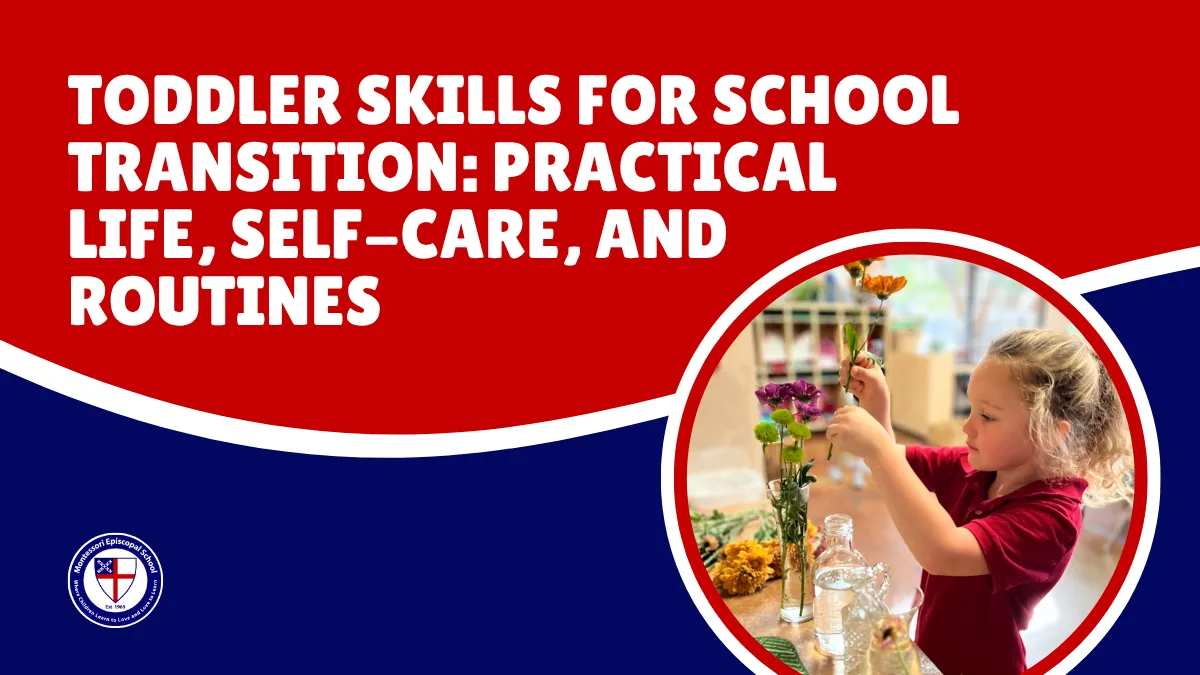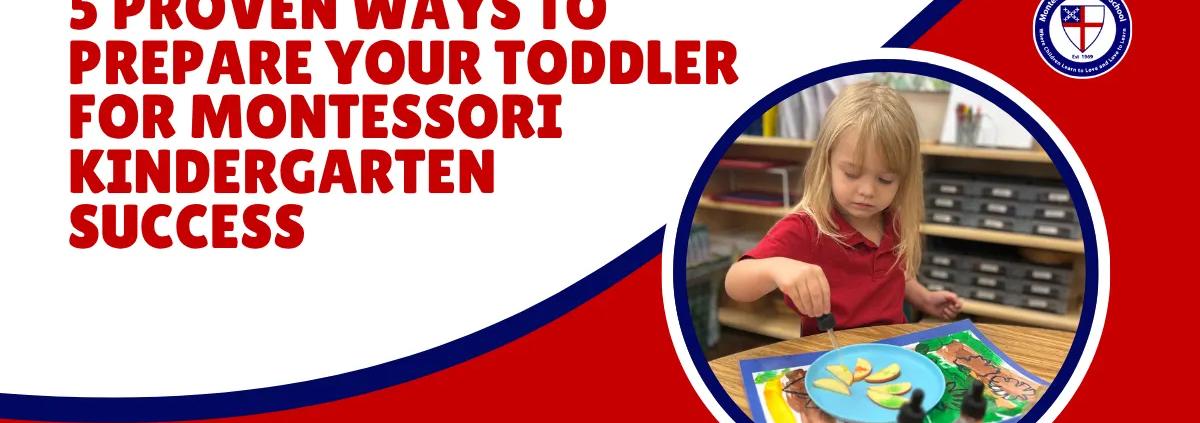5 Proven Ways To Prepare Your Toddler For Montessori Kindergarten Success
Montessori kindergarten readiness checklist items focus on independence, concentration, and social-emotional skills that help toddlers thrive in a child-centered environment. Preparing early means nurturing practical life abilities such as dressing, toileting, and caring for personal belongings, along with respectful communication, grace, and courtesy. Encourage sustained attention through calm routines, limited distractions, and hands-on tasks that build fine motor control and order.
Support early language and numeracy with rich vocabulary, real-world counting, and meaningful sensorial experiences. Finally, cultivate self-regulation and confidence by offering choices, modeling patience, and allowing purposeful movement—foundations that align closely with Montessori kindergarten expectations.
1. Toddler Skills for School Transition: Practical Life, Self-Care, and Routines
A focused approach to toddler skills for school transition builds independence, attention, and confidence before kindergarten. Establish simple, repeatable tasks with clear beginnings and endings, present each step slowly, and provide time for practice. These habits align with Montessori expectations for purposeful work, self-regulation, and respectful participation.
Practical Life Foundations
Practical life exercises strengthen coordination, concentration, and responsibility through real tasks using child-sized tools and defined sequences.
- Transferring and pouring: dry beans, water with a minor pitcher, careful spooning.
- Care of the environment: wiping a small spill, sweeping a defined area, and returning materials.
- Graceful movement: carrying a tray, walking around floor mats, and mindful body control.
Self-Care Independence
Personal care fosters autonomy and dignity while preparing children to manage belongings and hygiene at school. Present steps clearly and allow repetition.
- Dressing skills: shoes on and off, basic zippers, simple fasteners.
- Toileting readiness: predictable routines, elastic-waist clothing, thorough handwashing.
- Personal care: nose blowing, hair brushing, and placing used items in a bin.
- Snack preparation: peeling a banana, slicing a soft fruit, and pouring water.
Predictable Routines
Consistent rhythms reduce uncertainty and support smooth transitions between activities and environments.
- Morning flow: dress, tidy bed, breakfast, choose one purposeful task.
- Home work cycle: select, complete, return materials, brief acknowledgment.
- Transition cues: gentle timer, picture cards, or a short cue to signal shifts.
- Evening wind-down: light tidying, bath, story, early bedtime.
These foundations cultivate order, coordination, and self-reliance, creating readiness for Montessori kindergarten.
Preparing Child for Montessori Environment: Home Setup, Choice, and Independence

A prepared home environment helps children engage in purposeful work with calm focus. Organize spaces at the child’s level, limit visual clutter, and offer a small number of well-chosen materials. Clear order, real tools, and consistent routines build confidence and concentration that transfer to the classroom.
Home Setup
Design spaces that invite careful movement and responsibility.
- Accessible shelves: low, open shelving with 6–8 activities displayed on trays.
- Defined work areas: floor mat or small table to frame each task.
- Real, child-sized tools: a small broom, sponge, pitcher, and cloths.
- Logical order: labeled baskets, a place for everything, and a simple cleanup routine.
- Natural elements: soft light, plants, and neutral tones to reduce distractions.
Choice with Clear Limits
Choice supports agency when options are purposeful and finite.
- Rotate materials: observe interests and replace items that are no longer in use.
- Offer two to three options: “Would you like pouring or sorting?”
- One activity at a time: choose, complete, return, then select again.
- Model care and courtesy: slow demonstrations, calm voice, and respectful language.
Stepwise Independence
Break tasks into manageable steps and allow repetition to strengthen skill and self-belief.
- Self-care stations: a low mirror, a brush, tissues, and a laundry basket.
- Snack preparation: peeling, slicing soft fruit, spreading, and pouring water.
- Practical life cycles: water plants, dust a shelf, polish a wooden object.
- Follow-through habits: start-to-finish expectations, gentle reminders, and visual cues.
This structure fosters order, purposeful choice, and steady independence—cornerstones of success in a Montessori kindergarten setting.
3. What Skills Should Preschoolers Have: Language, Early Math, and Social Readiness
A balanced readiness profile includes clear communication, foundational numeracy, and respectful participation in group life. These skills support concentration, independence, and purposeful work in a Montessori classroom.
Language Development
Rich, precise language nourishes thinking and social connection.
- Vocabulary growth: name items in the home and outdoors; classify by category, function, and attributes.
- Listening and sequencing: follow two- to three-step directions; retell events in order.
- Articulation and expression: speak in complete sentences; ask and answer who, what, where, and why questions.
- Book habits: handle books carefully; track left to right; identify rhymes and initial sounds.
- Writing readiness: strengthen pincer grip through practical life and pre-writing trays.
Early Math Foundations
Concrete experiences build accurate concepts before symbols.
- Counting with meaning: count real objects to ten and match the quantity to a numeral.
- One-to-one correspondence: place a single bead or counter per count; check work for accuracy.
- Comparisons: use language of size, length, weight, and capacity; order objects from smallest to largest.
- Patterns and classification: extend simple AB patterns; sort by color, shape, and attribute.
- Introduction to symbols: recognize numerals 0–10 and connect to quantities.
Social Readiness and Grace and Courtesy
Social maturity allows children to learn alongside peers with confidence.
- Care of self and space: tidy a work area, return materials, and wash hands independently.
- Waiting and turn-taking: request a turn, wait briefly, and observe respectfully.
- Problem solving: use calm words to state needs and negotiate simple solutions.
- Community language: greet others, make eye contact, and say please and thank you.
- Emotional regulation: identify feelings, choose a quiet space, and rejoin work with focus.
These competencies form a steady foundation for Montessori kindergarten success.
4. Montessori Kindergarten Readiness Checklist: Concentration, Order, and Follow-Through
Strong concentration, clear order, and consistent follow-through enable children to work purposefully and complete multi-step tasks. These habits support independence, respectful participation, and steady progress in a Montessori classroom.
Concentration
Nurture deep focus with calm routines and uninterrupted work periods.
- Sustained attention: engage with a chosen activity for 10–15 minutes without switching tasks.
- Single-task focus: begin one task, complete it, and check for accuracy before selecting another.
- Minimal distractions: work in a defined space with limited visual and auditory clutter.
- Purposeful repetition: repeat an activity to refine skill and build confidence.
Order
Order in the environment develops order in the mind.
- Prepared space: materials arranged left-to-right, simple-to-complex, with all parts contained.
- Care of materials: carry a tray safely, use tools correctly, and keep pieces together.
- Return to place: finish work and return it to the proper shelf position for the next child.
- Sequencing: follow a clear step sequence (lay mat, set materials, work, restore, reflect).
Follow-Through
Completion builds responsibility and self-belief.
- Clear beginnings and endings: identify the start and finish of each task and confirm completion.
- Self-check habits: compare work to a control of error or model and make necessary corrections.
- Task persistence: remain with a challenging step using calm strategies before seeking help.
- Grace and courtesy: signal readiness to transition, tidy the area, and rejoin group activities respectfully.
Children who demonstrate concentration, internalized order, and reliable follow-through arrive ready to benefit from Montessori’s self-directed learning and collaborative community.
5. Kindergarten Success Planning: Parent–Teacher Partnership and Progress Monitoring
A strong home–school partnership ensures that each child’s strengths, needs, and growth areas are understood and supported. Clear communication, shared goals, and consistent follow-through help children experience continuity between the classroom and home.
Collaborative Communication
Establish predictable channels that respect teachers’ time and provide parents with clarity.
- Scheduled touchpoints: brief weekly updates, plus a monthly summary of focus areas.
- Two-way notes: concise observations from home and school to align strategies.
- Timely concerns: address emerging challenges early to prevent patterns from forming.
Shared Goals and Observation
Define attainable objectives and track them through concrete behaviors.
- Individual goals: one to two targets per cycle in practical life, language, or social skills.
- Observation windows: short, focused observations during work cycles to gather unbiased data.
- Adjustment protocol: refine goals when mastery is evident or support needs increase.
Progress Monitoring Tools
Use clear, developmentally appropriate measures that reflect Montessori practice.
- Checklists and rubrics: simple indicators for independence, concentration, order, and follow-through.
- Work sampling: photographs or brief notes documenting sequences completed with accuracy.
- Control of error review: child self-checks paired with teacher verification to confirm mastery.
Home–School Consistency
Reinforce classroom habits with aligned routines at home.
- Practice opportunities: short, purposeful tasks with clear beginnings and endings.
- Grace and courtesy language: shared scripts for requesting help, waiting, and tidying.
- Reflection moments: calm debriefs that highlight effort, precision, and responsibility.
This framework promotes transparency, celebrates growth, and ensures that each child progresses steadily toward Montessori kindergarten success.
Conclusion
A thoughtful readiness plan gives young children the confidence, concentration, and independence they need to begin Montessori kindergarten easily. When families prioritize practical life skills, respectful routines, and a calm, orderly environment, children arrive prepared to choose purposeful work, sustain attention, and carefully complete tasks. Clear language habits, concrete early math experiences, and consistent grace and courtesy strengthen classroom participation. With these foundations, children step into Montessori kindergarten ready to learn, collaborate, and thrive.
Ready to discuss your child’s next steps? Contact our team to plan a visit and explore how we can support your family’s goals: (972) 895-9050, https://montessoriepiscopal.com/contact/.



Leave a Reply
Want to join the discussion?Feel free to contribute!